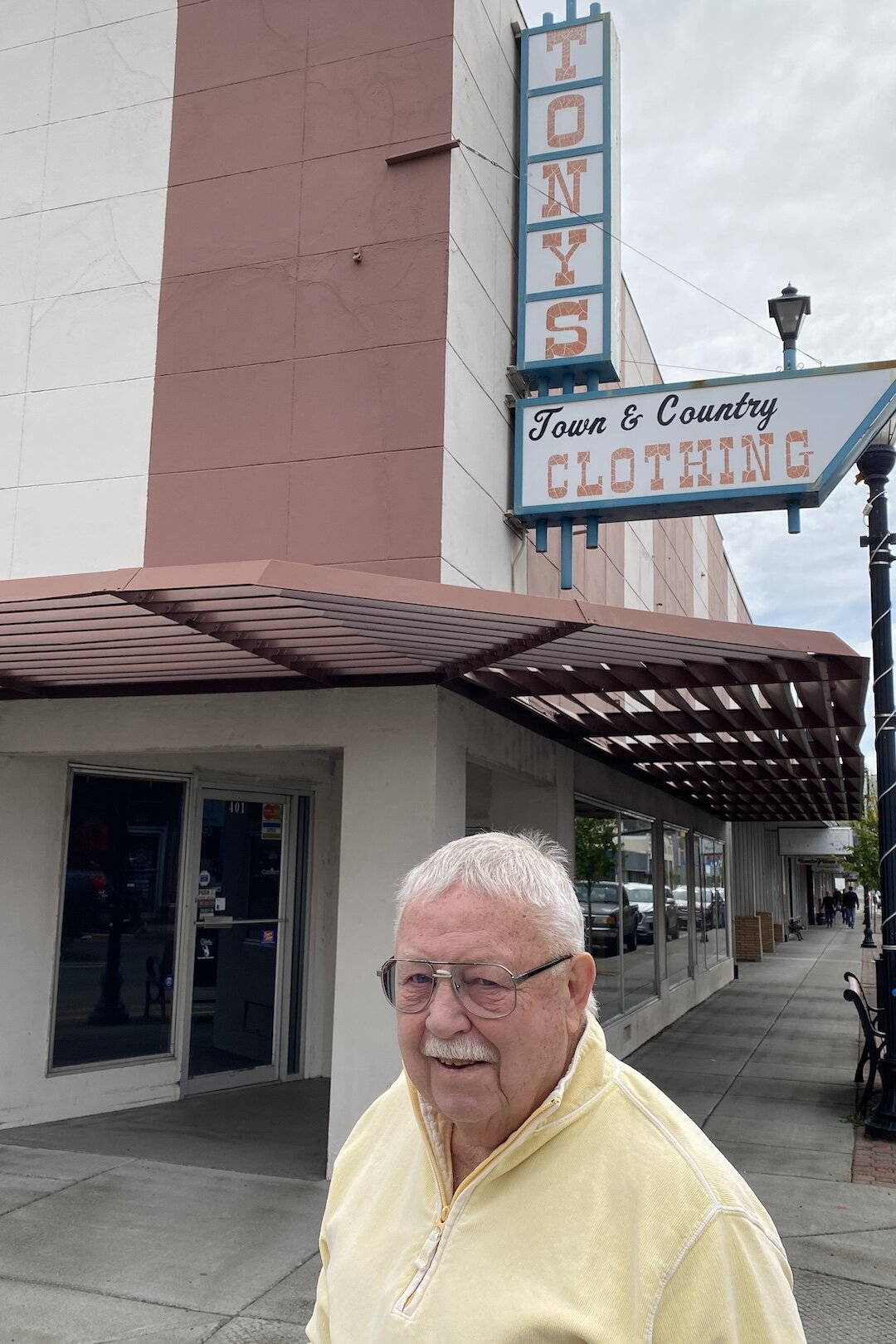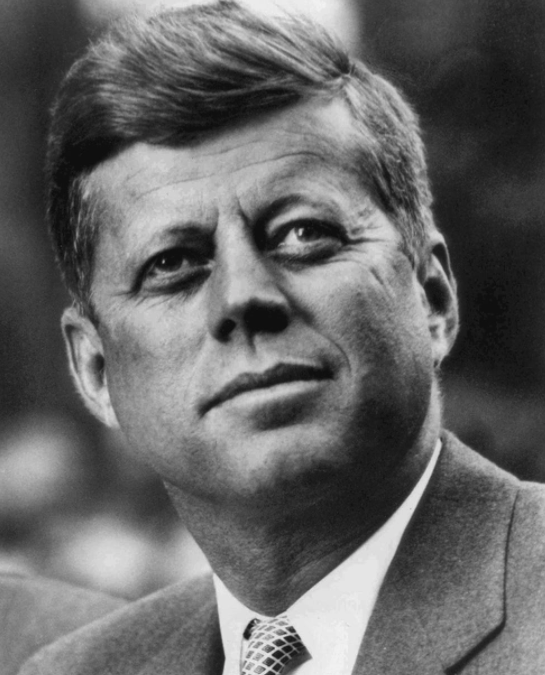Flashback Friday: Can't Take the Tony out of Tony's Town & Country
Tony Foote, now retired, can remember a bet or two going down at his former clothing store on East Second Street. There was also the time he hocked a little burned beer and booze. But he always kept an eye to his customer whether they needed a hat, boots, or a fine meal at Oly’s Supper Club at 2620 West Second St. Don’t even ask about the moonshine.
Tony Foote’s Double Or Nothing
By Tom Peterson
For 40 plus years, a trip to The Dalles would not be complete without a stop in at Tony’s Town & Country.
The store is revered by many and still brings a smile to people’s faces when the name is mentioned.
“I had friends come from Japan,” said Victor Johnson who grew up in The Dalles. “They would flip over Tony’s. It was an authentic place with hats and boots and giant towers of Levis. There was every size you could imagine.”
Blue-collar stiffs bought Redwings and rugged workwear.
Steel-toed boots, Carharts.
Think loggers and railroaders. Think rodeo.
Classic Tony Lama Poster from back in the day at Tony’s Town & Country, which had one of the largest inventories of western ware in the Pacific Northwest.
The store held contracts with Union Pacific, Les Schwab, Waste Management for tough and safe clothing and footwear.
“It was a great store. I loved that place,” said Mike Blair of the Dalles.. “I wish it was still open.”
“It was a real trading post,” said Tony Foote, now 80.
And sometimes a gambling joint.
Tony liked to flip coins.
He once flipped double or nothing on a pair of Ostrich skin cowboy boots.
“That one still stings,” he said.
It cost him $400.
But more often than not, Foote was on the winning side of deals, and willing to entertain to make the sale.
He kept a full bar in the back of the business and often treated a customer to a shot while their clothes were being tailored by Valentine Bauer, a German who could hem a pair of pants in 10 minutes in the back of the store.
Foote said he focused on relationships in the business, willing to pay for an expensive meal or treat somebody to a drink.
He said those relationships were what propelled him and the business through four decades.
“You have to treat people right,” he said. “It always paid off.”
Foote carried the largest inventory of Levis in the Pacific Northwest for a store his size. The store boasted 5,000 pairs of cowboy boots and 20,000 pairs of Levi’s in 1990. He could get Levi’s when other stores couldn't.
Customers came from Yakima, Grass Valley, Rufus, Antelope, Celilo Village.
Victor Johnson with the Original Swinging Saloon Doors from Tony’s Town & Country. Man, if those doors could talk.
Victor Johnson said Tony’s was a magical place for a kid getting their first pair of cowboy boots.
“I used to get really good outerwear, I have a nice jacket from there,” he said.
“But I will tell you from being a kid at that place, it was magical. That is where you went to get your first cowboy boots, especially at rodeo time. You would pick a boot out and they would go in the back room and come out through those swinging saloon doors. It was so awesome.”
Johnson ventures a guess that there are a few nostalgic photos about town of young kids now adults in their new cowboy boots bought at Tony’s.
Tony said he would sell most anything.
The Budweiser beer distributor had a warehouse across the tracks just north of his building.
“One time the beer truck caught on fire,” he said. “The beer got smoke damaged, and they sold it for 50 cents a case at the dock. I bought all I could. I’d resell them for $3 or $4 a case. Anything to make a buck.”
Between the wheeling and dealing, there was also a store to run.
“In the ‘80s, we were working seven days a week 10 hours a day unpacking and pricing and selling,” he said.
He estimated some 800 employees worked for him over the breadth of his career.
Foote also stocked Pendleton blankets. He said Native Americans were buried in them, and the more revered a tribe member was the more blankets they would be wrapped in. He said his store was cleaned out when Flora Thompson died in 1978. She was the wife of Celilo Chief Tommy Thompson. She was buried in 27 Pendleton blankets, he said.
Foote eventually became a 50-50 partner with Jim Day, who took it over in 2000.
“We never had a fight,” Foote said, admiring the friendship.
And Bonnie Foote, Tony’s wife, ran the women’s department and was in charge of selecting fashions starting in 1990.
In the Beginning
Originally, the business started as a partnership between Foote and his father Gordon in 1965.
Tony had started working for Gordon at Herman’s Men’s Store in 1951- it was in the same building that Tony’s Town & Country later occupied.
He and his Dad did not get along when he was in high school.
Tony would have to carry metal suitcases of stock into the store and his Dad thought he should carry two at a time. Tony disagreed.
“He fired me every Saturday,” Tony said.
Foote joined the Marines after high school and worked construction after rousting out.
He said he walked a lot of I-beams in those days while working on bridges for the new Interstate 84.
“The union would send out 10 news guys. The next day they would all quit. Didn’t like heights, I guess,” he said.
President John Kennedy, 35th President of the US
On Nov. 23, 1963, Foote was walking an I-beam high above a Shell gas station below. A lady yelled up to him.
“President Kennedy got shot,” she said.
“That’s good to know, but there is not much I can do about it up here,” was his return.
John Day Bridge after collapse in ‘64.
Foote also worked on the bridge that crossed the mouth of the John Day River in December of 1964. He and his workmates drove across it just ten minutes before it collapsed during the Christmas Day Flood. Three others were not so lucky. They disregarded the barricade and plummeted to their deaths in their vehicle.
Back in TD
Foote soon after landed at Sears selling washers and dryers. His Dad came to him with the idea of partnering in Tony’s Town & Country.
“I’ll do it on one condition,” he told his Dad. “We were doing $120,000 in sales a year…”
Photo of car mangled in metal supports. It plummeted off the John Day Bridge during the Christmas Day Flood in 1964. The driver and two passengers were killed. Foote worked on the bridge and drove over it 10 minutes before its collapse.
I told him, “I would partner and manage the store as long as we never go backward and you don’t give me any $hl$.”
It worked out.
“We went from $120k to eventually $1.5 million,” he said.
Foote retired in 2000, and Day eventually closed the store and the building was sold to the Urban Renewal in 2016 for $420,000.
Most recently TD Fitness Hub, a group of local partners made up of Brian and Peggy Cassidy and The Zukin 2002 Family Trust considered purchasing the building.
But inspectors found more than $700,000 in repairs necessary to make the building safe and usable, killing the deal. A leaking roof, HVAC, foundation cracks and multiple other issues mired the project in costly repairs.
So, now the question remains.
Does it cost more to tear it down or fix it up?
Bids on the cost to tear it down are expected in weeks to come, according to Columbia Gateway Urban Renewal Chair Gary Grossman.
Foote had reservations about losing the mural on the side of the building, he also understood that times were changing. He noted how difficult it is for retailers to compete against bigger stores such as Coastal Farm & Ranch.
He agreed with reinventing the block with a new building and residential housing which is needed in The Dalles if it comes down to it.
“It is going to have to be torn down and start over,” he said. “There’s no hard feelings over it.”
This story brought to you by Brown’s Roofing, preserving history one roof at a time.






